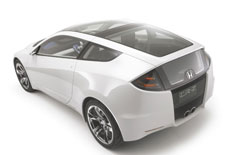A hybrid vehicle combines a standard engine with an electric motor powered by batteries. Together, the two energy sources power the vehicle.
Are two engines really better than one?
Yes. The electric motor helps the standard engine operate more efficiently, cutting down on fuel and emissions. The combustion engine overcomes the range limitation of a purely electric vehicle.
So how do you recharge the batteries?
From regenerative (read free!) energy captured from deceleration and braking. A hybrid never needs to be recharged from an external power supply.
What Hybrids are available and what’s the difference between them?
The principle difference is the size of the motor and battery pack. The Toyota Prius and Lexus models have larger motors and battery packs meaning the system is heavier.
In models like the Civic Hybrid, the battery/motor pack is smaller but this means that the system is lighter.
In the Honda system, the engine runs in conjunction with the battery all the time. The Toyota system runs on the battery at very low speeds before engaging the engine as the speed rises. Cars like the Civic Hybrid and Prius are also known as low-emission hybrids. Cars like the Lexus hybrid reduce the overall emissions of a bigger engine – but nowhere near the levels of the Civic Hybrid or Prius. The taxation advantages are also much less.
So I can save on fuel costs but are there any other reasons why I should buy a Hybrid?
The driver saves on a variety of things: fuel, emissions and tax. At 109g/km the Civic Hybrid only attracts a 10% benefit-in-kind company car tax rating. It’s also exempt from Congestion Charge.
Furthermore, emissions of NOx (nitrous oxides) and PM (sooty particulates) that affect local air quality are significantly lower than comparable diesel powered models. There’s also the benefit of 100% first year writing down allowance, which is beneficial from a Corporation Tax point of view. The Toyota Prius also benefits from all these features.
How long have they been available?
The first hybrid arrived on UK roads with the Honda Insight in 2000. It was followed by the Toyota Prius. Since then Honda, Toyota and Lexus have produced a number of hybrid models.
Are Hybrids here to stay?
Rising fuel prices (and the growing differential between petrol and diesel at the pump) coupled with new model introduction will help grow Hybrid’s popularity. For companies looking to reduce their emissions, and genuinely looking to improve air quality along with their driver’s tax bill, they continue to be a very attractive proposition.
Editor’s note: This article was originally written by Harvey Hughes when he was corporate operations, Honda








